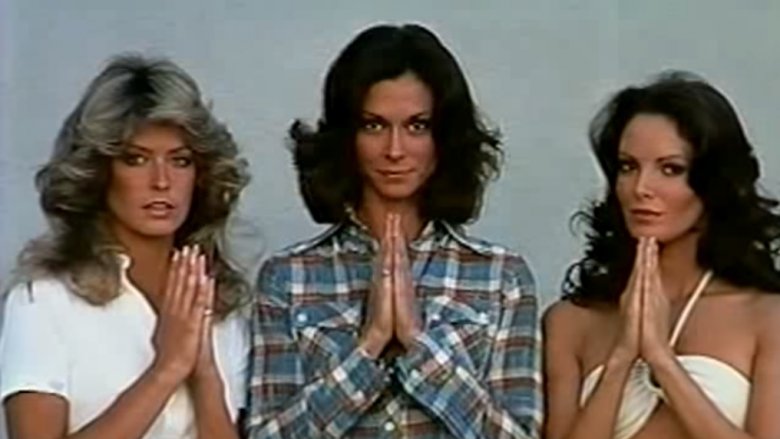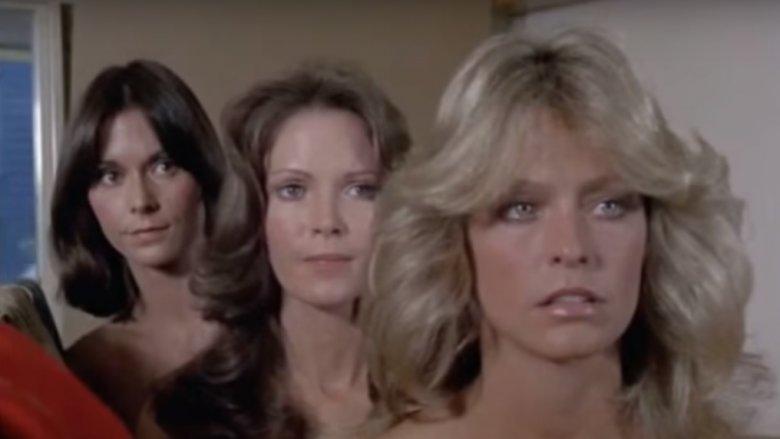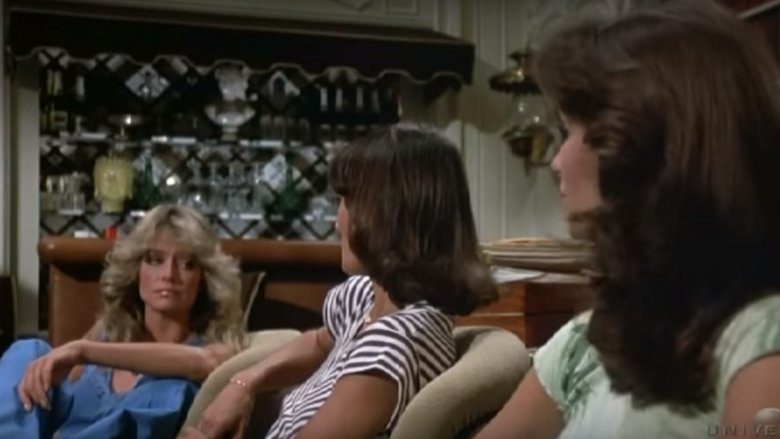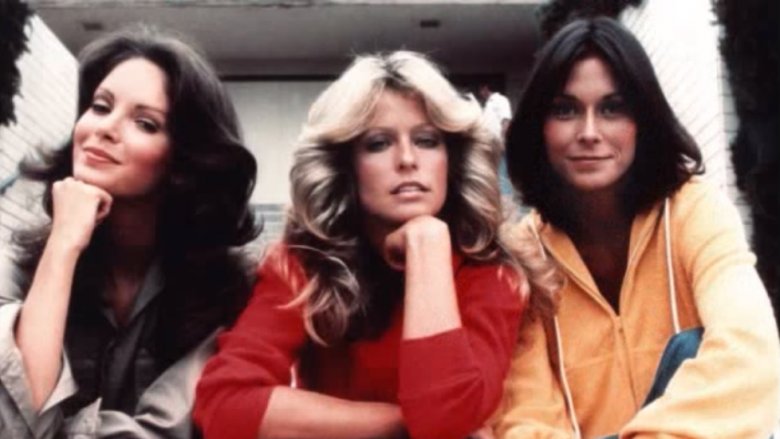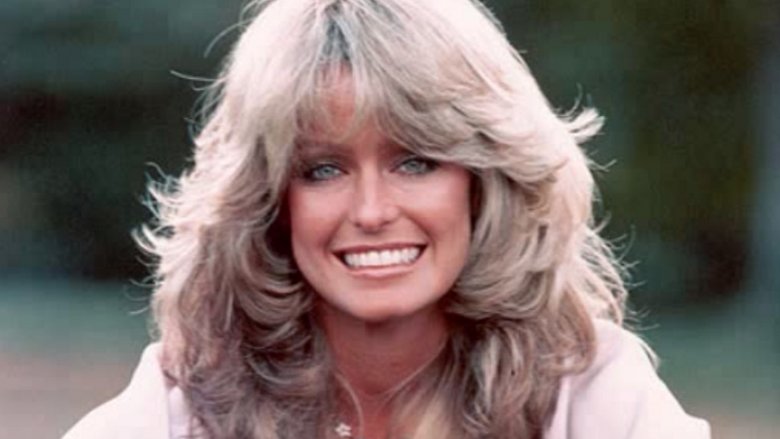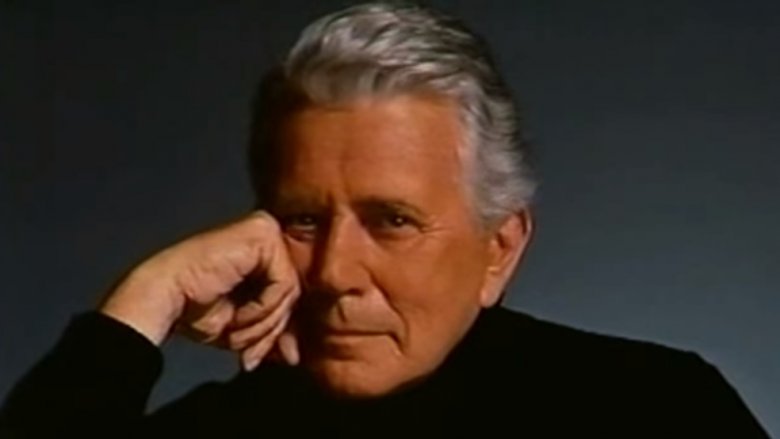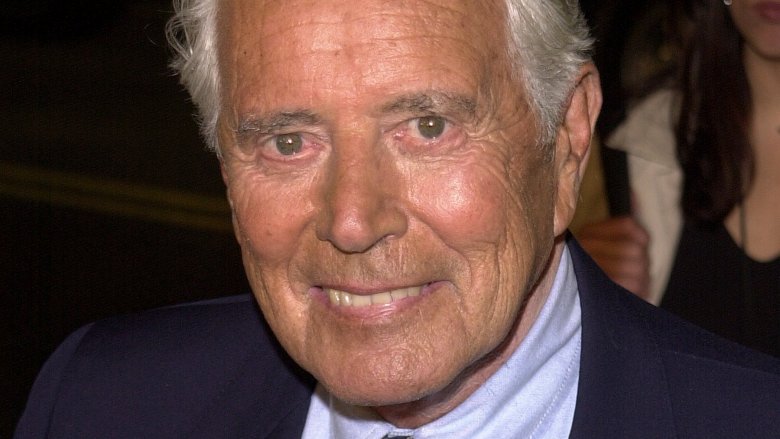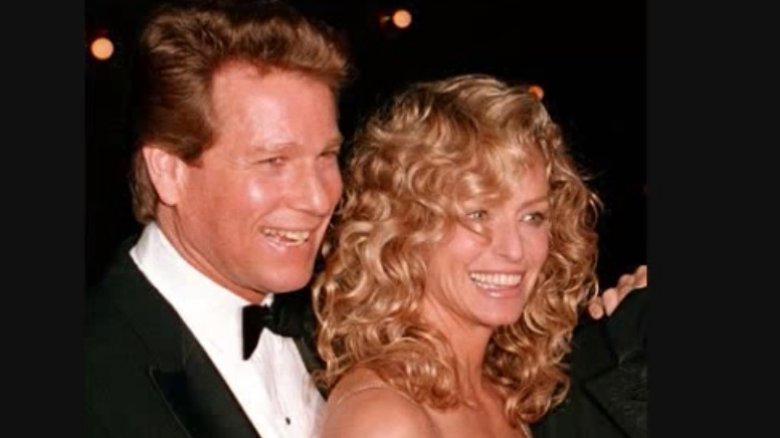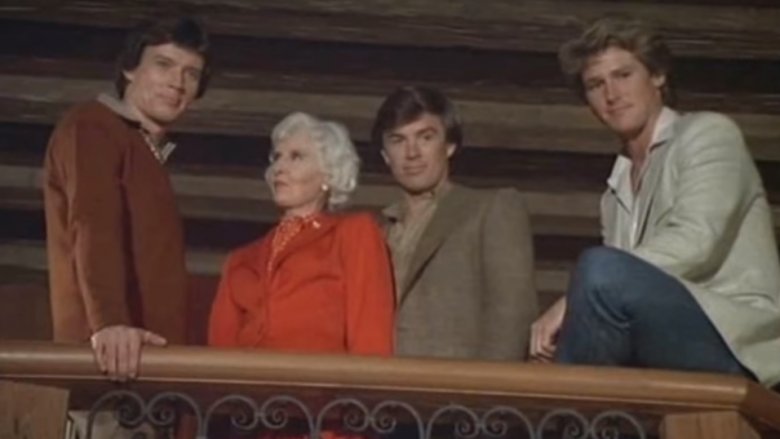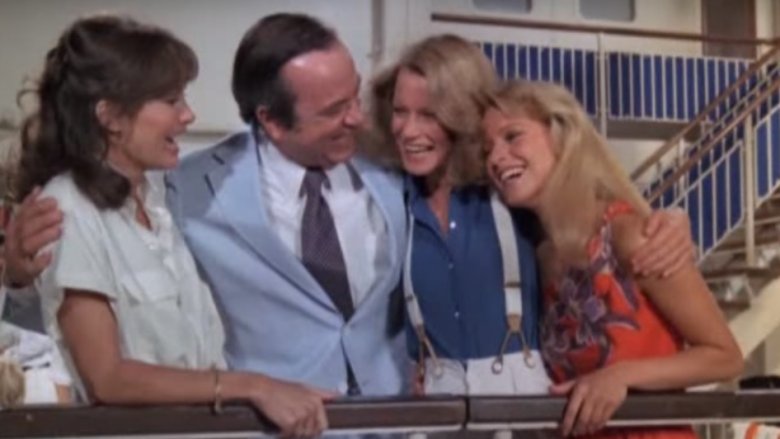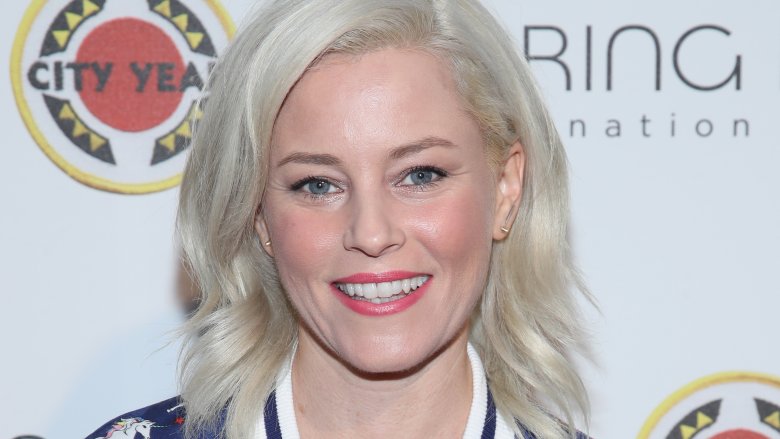The Strange History Of Charlie's Angels
The year was 1976. Hair defied all known laws of physics, you had to trawl through masses of glitter and flared bell-bottoms just to get to your box-shaped car, and male-oriented crime shows like Hawaii Five-O and Starsky and Hutch dominated primetime TV airwaves. In this manly world of sideburns and turtlenecks and cigar smoke, cagey network execs weren't convinced that a trio of women could carry a crime show all on their own, but they needn't have worried: Charlie's Angels was an instant smash. Jaclyn Smith, Kate Jackson, and Farrah Fawcett soon became household names, and critics could only look on mournfully as the show dominated the ratings week after week — for a while, at least.
From its phenomenally successful 1976 debut to its unceremonious cancellation in 1981, Charlie's Angels went through a wild variety of ups and downs across its five seasons. With all its contentious cast changes, meddling network executives, behind the scenes drama, mid-century network TV weirdness, and just plain bad luck, the show had a surprisingly rich history. Time for a quick costume change — or eight, if you really want to do the Angels justice. Here's the weird story of Charlie's Angels.
It introduced jiggle TV to the world
Charlie's Angels always sat somewhat uneasily in the company of 1970s second-wave feminism — and when the opening voiceover refers to the Angels right up front as "three little girls who went to the police academy," it's not hard to see why. Some did champion the show as a bastion of female empowerment. Jaclyn Smith, for example, maintained that it was "groundbreaking" and "inspirational" in an interview with People, and claimed female fans used to send her letters of gratitude for the show's establishment-challenging clout.
Not everyone felt the same way. Critics blasted the show, taking issue with everything from the acting to the wafer-thin plots — and then of course the even thinner wardrobe. Producer Aaron Spelling wanted someone in a bikini in every scene, according to one of the show's costumers, and even Farrah Fawcett claimed, "When [the show] got to be number one, I decided it could only be because none of us wears a bra." It's said to have ushered in the era of jiggle TV and popularized the term.
Some academics have since made the case that a lot of the accusations of sexism were short-sighted and unfair. However, when other female-centric shows like The Mary Tyler Moore Show were setting genuine progressive precedents at the time, according to the Washington Post, the Angels' lack of substance and abundance of jiggling stuck out like a sore thumb.
It was almost a whole lot stupider
So the show was a little out of step with other boundary-pushing shows of the era, and the patriarchy-slaying goodness of something like Buffy was still a couple decades out. But if Charlie's Angels was criticized for its lack of substance and cheap titillation, the initial concept for the show very nearly went down a much lazier, skeezier path.
According to Newsweek, producer Leonard Goldberg had originally pitched the show as "Alley Cats" — so-named because the central characters were Al, Lee, and Cat. Har har, moving on. The trio were written as sultry, leather-clad police officers, but actress Kate Jackson shot this down. A seasoned pro by that point, Jackson was the first to be cast and the show was originally intended to be a vehicle for her. She even came up with the "Angels" moniker after noticing a picture of some cherubs in producer Aaron Spelling's office. It was also Jackson's idea that the trio be secret agents as opposed to the originally proposed police officers. Jackson might have been labeled "difficult" as time went on, but the show as we know it would've never seen the light of day without her.
A pilot so nice they aired it twice
Even after Kate Jackson had knocked some sense and some semblance of class into the show's premise, producers Leonard Goldberg and Aaron Spelling were met with a tough crowd when they first pitched the Alley Cats idea to ABC, according to the Sunday Post. Network executives Barry Diller and Michael Eisner hated the idea, saying it was the worst one they'd ever heard. Because they'd already agreed to put up $25,000 for a new script as part of a previous deal, according to Goldberg, they let them write the Angels script but expected nothing of it.
Clocking in at 74 minutes, the Charlie's Angels pilot was aired in March 1976 and received enormous ratings. ABC was so incredulous that they aired it again the following week to make sure it wasn't a fluke. It did just as well the second time, and they were off to the races — the show was firmly in the ratings top 10 and soon captured the eyes of 59 percent of U.S. households with TVs.
The network had a habit of clipping their wings
We might be neck-deep in the golden age of television right now, with A-listers clamoring for a piece of that sweet, sweet TV pie, but things were different in the late '70s and early '80s. Sure, you had M*A*S*H, and ... well, M*A*S*H, but for the most part the small screen was considered small-time for an actor. A career in movies was always the ideal.
Accordingly, Charlie's Angels' central trio dreamed a little bigger than the confines of the audience's living room — and to be fair, Charlie's Angels wasn't exactly prestige viewing. But the network execs made a bit of a habit of stifling the central cast's career ambitions beyond the show, as People recalls. When Fawcett wanted to leave after the first season to pursue a film career and work on her marriage, ABC sued her for breaching her contract. Fawcett beat the lawsuit, but was obligated to make six guest appearance over the rest of the show's run.
Then there's Kate Jackson, who was offered the Meryl Streep role in Kramer vs. Kramer in 1980 — Streep won an Oscar for that — but the head honchos refused to rework her schedule to let her do it. She was already nearing the end of her rope with the show, and that was enough to give her the final push out the door. She left after the third season.
Some legends are born wearing PJs
John Forsythe ping-ponged between stage and screen — both big and small — pretty consistently over his six decades as an actor, but television was where he found his voice. It wasn't until he was cast in Dynasty in 1981 that he became a famous face, but landing the role of Charlie a few years earlier ensured that he already had one of the most famous sets of pipes around. It was possibly the cushiest job in television at the time, and it basically fell in his lap.
Oscar winner Gig Young was initially cast as Charlie, but on the first day he showed up too wasted to record his lines. Producer Aaron Spelling called up Forsythe in a panic in the middle of the night, begging him to fill in. Ever the pro, Forsythe obliged, but on his own terms. According to the man himself, he didn't even get out of his pajamas that first day. He got out of bed, threw on a coat, drove to the studio, recorded his lines, then "went home and went back to bed." He'd go on to provide the voice of Charlie for the next five seasons, taking part in every episode other than Season 4's "Avenging Angel."
It was still a man's world
These days, Hollywood's gender pay gap problem is being subject to some well-earned and long-overdue scrutiny. The discrepancy has been blatant for a while now, and actresses and their allies are pushing back — but considering how bad it's been in the past, it's a wonder heads didn't start rolling a long time ago. The problem absolutely remains, but we might as well be living in some post-patriarchal paradise compared to what the Charlie's Angels cast were dealing with.
John Forsythe was the highest-paid cast member on the show — and on TV in general at the time, according to The Telegraph — despite the fact that he never appeared on the show in person and was never on set. In the show, Charlie would give the Angels their assignments over speakerphone. His face was never shown, but he'd often be seen from the back, usually accompanied by beautiful women. But that was never the back of Forsythe's head we saw — his job was done as soon as he left the recording booth, while the Angels themselves were working 12- to 14-hour days, five days a week, for much lower pay.
Bizarrely, Forsythe randomly met Farrah Fawcett for the first time at a tennis court years later. As he remembered it, "I was coming off the court when she came up to me and said, 'Charlie! I finally met Charlie!'"
Bad for marriage?
Showbiz relationships are hard to maintain at the best of times. The long hours combined with the pressures of fame and constant media attention seem to take a hell of a toll on the couples caught in their wake. The Angels knew about this all too well, according to Express, as their time on the show seemed to have a particularly damaging effect on their marriages.
Farrah Fawcett would ultimately become the show's breakout star, but before being cast as Jill Munroe she was primarily known as the wife of Six Million Dollar Man Lee Majors. Credited as "Farrah Fawcett-Majors" on the show, her marriage to Majors influenced her time there in unusual ways. Chiefly, she had it written into her contract that she be allowed to leave by 7 p.m. in order to get home and make him his dinner, according to People. When she left the show after the first season, it was at least in part to work on her marriage, which ultimately failed. Kate Jackson, Jaclyn Smith, and Fawcett's replacement Cheryl Ladd also divorced their partners either during or shortly after the show's run.
The press filed these marriage woes under what they called the "Angel Jinx," along with the serious illnesses and personal tragedies endured by the main cast over the years. Tabloid fodder? Maybe, but it does act as an interesting footnote to a show that would become plagued by bad fortune and diminishing returns in general.
One gender-swap too many
Charlie's Angels was already intended to be a gender-swapped version of the traditionally male-led cop show, so the idea of swapping the genders again and trying to make a male version of the show work was always going to leave people scratching their heads. It may have been ill-conceived from the start, but that didn't stop Spelling and co. from giving it a go.
It was in the fourth season that the show attempted to expand its appeal and extend an olive branch across the supposed gender divide, with the episode "Toni's Boys." As MeTV recalls, the episode saw Charlie reaching out to a rival agency, led by Antonia "Toni" Blake (played by Barbara Stanwyck), after an attempt is made on the Angels' lives. Toni oversaw her own crime-fighting squad, consisting of a master of disguise, a rodeo superstar, and a former Olympic champion. Charlie had his Angels, and Toni had her boys. It was intended to act as a backdoor pilot for a spin-off series, but it didn't take off, and the boys — Bob Sorenson, Matt Parrish, and Cotton Harper — never became household names.
Crossover pioneers
After Kate Jackson's departure at the end of the third season, the producers wanted to introduce her replacement Shelley Hack with as big a splash as possible. This meant a trip to ABC's The Love Boat was in order, apparently, and in the process a campy, beloved network TV staple was pioneered: the crossover episode.
The show had flirted with the notion of a crossover before, when the Angels were visited by a character from the ABC show Vega$ in Season 3, but this time they went all in. The episode, entitled "Love Boat Angels," saw the team taking a cruise on the titular Love Boat to catch an art thief. The gimmick seemed to work, the episode got to #1 in the ratings, but the initial hype wasn't enough to sustain people's interest for long. Ratings dwindled as the show went on, and it turned out to be Hack's only season on the show. She was unceremoniously let go and replaced by Tanya Roberts, the sixth — and final — Angel for what would be the show's very last season.
Revival woes at home and abroad
It might have been a critical punching bag and a few worlds away from high art, but Charlie's Angels casts such a long shadow that attempts to recapture that initial spark have been consistent ever since the show ended, and they've rarely been successful.
In 1981, the show was canceled after five seasons and six different Angels in total, and soon came a slew of attempted revivals. The first attempt came in 1988, with the title "Angels '88" — changed to "Angels '89" a year later after production delays — but it never got off the ground. The show was rebooted by ABC in 2011, complete with a more stylish, dramatic tone, according to Fast Company, but this version lasted all of four episodes. There was also a Spanish-language version of the show called "Angeles" launched in 1999, and a German version called "Wilde Engel" or "3 Wild Angels" a few years later, neither of which lasted long. The 2000 movie starring Cameron Diaz, Drew Barrymore, and Lucy Liu fared a little better, deploying a healthy dollop of campy self-awareness and enjoying surprise box office success, but the joke had run thin by the 2003 sequel.
The powers that be are still determined to resurrect the Angels and see them soar. Most recently, Elizabeth Banks is helming a new reboot slated for a 2019 release, according to Variety. Here's hoping this one gets it right.
